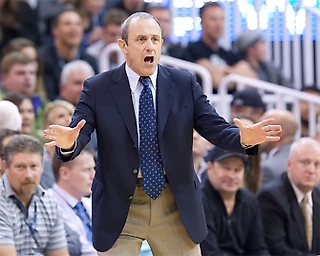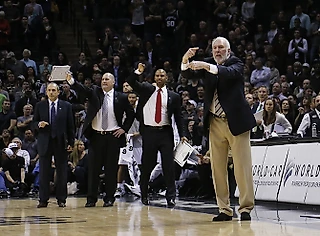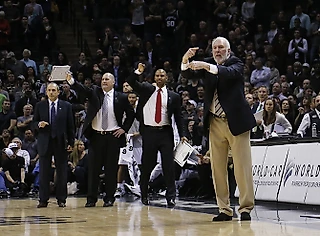No despotism - just responsibility
Out of all ideas of the first basketball related entry in my blog I chose to start with some basic concepts that, in my opinion, make the essence of coaching profession.
The biggest question for the people who organize other people to work together is: what’s more important the rules we try to set or the people who should behave according to these rules?
I’d like to offer a different perspective on this topic. The main idea about managing people is responsibility.
The responsibility is the feeling of pushing yourself to do your job the best possible way on a daily basis.
I’ll never tell my players that they should go to bed early the evening before the game. They should simply know that. It should be their responsibility, part of their working ethics. Responsibility is to care about the result even if nobody is watching you.
My job as a coach is to help my players to get to a point where they feel responsible to behave the certain way to help the team and the organization, not because they are pushed or whipped, but because they take responsibility for that.
Setting rules and over-control are not enough. If you set rules and behave like policeman to make people follow the rules, they’ll end up going out of control just for the fun of breaking the rules. If a team means only people and rules, there’s no responsibility involved.
In order to feel responsible, first, you must understand the goal. Second, you must feel that you can reach that goal.
If I give a team of kids the goal to win Euroleague, they won’t accept it. They will immediately understand that it’s impossible. As a result, they won’t put on themselves any pressure to be responsible for achieveing this goal. If players don’t feel that the goal can be reached you’ll never put your team together.
Before accepting a goal, players first evaluate professional level of people they are working with: their teammates, coaches, organisation. If players feel that the team is not strong enough, they’ll think "Even if I work like crazy, we’ll never make it. Let’s play it safe". Consequently, the coach will lose control over the team.
Another example. It’s useless and definitely it’s a bad idea to keep saying "we must win Euroleague" during the season. Instead, you should create smaller goals to achieve. Let’s make Top-16. There is no point in speaking about winning the Final Four, if you don’t get to Top-16…
As long as you have worked out smaller goals and your players feel that they can achieve it, you can press on them if they perform below the level that is needed to reach the goal. The opposite is over-pressing players with something they don’t feel achievable. There will be no players’ responsibility, only coach’s responsibility.
Managers cannot be too idealistic to think people live only to reach common goals. Maslow’s famous hierarchy of needs says: everyone will first of all satisfy his personal basic needs. Any player wants to know if he plays, if he gets a new contract, if he has a future in this team. If a player feels that all his individual needs will be satisfied by reaching common goal, only then he will give out 100% to help the team.
So, my job and club management’s job is to always try to understand if a player feels the possibility to reach the goal together with the team and if common goals include his personal goals.
When people are responsible they are self-disciplined. There are two levels of discipline: 1) normal, when you are disciplined by others, 2) higher, when you (here we’re talking about people who are extremely talented and ambitious) are disciplined by yourself.
I want to put this very clear. I’m not saying the team should be organized by themselves, neither each player decides what to do and what not. I’m just talking about responsibility. I can be really tough if I see people cannot learn with the time how to manage their responsibility.
I think, the ultimate goal for the player in team sports is to be respected by other players and coaches. You need self-discipline for this.
Self-discipline on the court is to pass the ball to our best shooter (say, he shoots 50% from three point range and I do only 30% and we need a 3-point play) even if I consider myself the best player in my team. How many times in your life you’ve seen just the opposite?
It happens one or two times a year in every team I coached when a player comes and says to his teammates: "I’m sorry. Today we lost because of me. I didn’t play on my level". This is a very good sign of responsibility.
When you have selected players with right mentality the process becomes self-sustaining. In every team I had 2-3 players who feel responsible for the team. Players feel teammates’ pressure much more acute than when it comes from the coach.
I was in Chicago Bulls training camp in 1996. They were practicing a lot. Guess who were the two players heading the line in every drill, even the hardest ones? Jordan and Pippen. Phil Jackson didn't even need to say "you start". Phil Jackson was explaining and first two players were always there.
You should have a very clear idea of individual responsibility in your team. Team is not a ship, meaning everyone’s performance is evaluated based on the team performance. It’s a very wrong idea of the team. In basketball and other team sports you should always understand who did well and who performed below his level and needs to work harder.
Lack of responsibility cannot be compensated even by huge talent. The higher competition’s level, the more responsible everyone in the team has to be. Because you need to perform every day at this level.
However this, let’s say, deviance from standard mentality can work out. Let me give you an example. Do you remember what happenned when Napoli signed up Maradona? They won the title. But that was only a short-term success. As soon as Maradona left the team, Napoli dropped down to Seria C within 3 years.
There can be other ways to manage people. I have simply explained what worked out for me. I was lucky that I worked for organizations where presidents and owners shared the same ideas with me.




